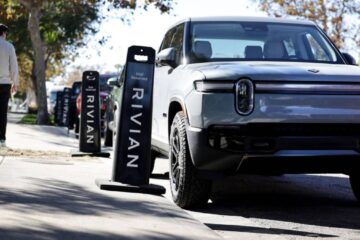With the U.S. Presidential election this week, the candidates are taking their last opportunity to make their cases to voters about hard-hitting and impactful issues.
Despite the endless discussion on the issues that grab headlines and attention, one particular subject has been raised more by Republican nominee and former President Donald J. Trump than Democratic candidate and current Vice President Kamala Harris: electric vehicles.
💰💸 Don’t miss the move: SIGN UP for TheStreet’s FREE Daily newsletter 💰💸
Though Kamala Harris and her running mate Tim Walz have strong records of being advocates for policies aimed at curbing climate change and promoting the adoption of electric vehicles, much of the same cannot be said about the opposing candidate and his running mate.
However, even with players like Elon Musk taking an active role, a new poll of voters in an important swing state shows that important policy regarding electric vehicles is somewhat divisive, even if it may benefit them.
The General Motors Lansing Grand River Assembly Plant in Lansing, Michigan.
Bill Pugliano/Getty Images
Federal taxpayer money to make EVs is a divisive issue
According to a new poll conducted by The Detroit News and local NBC affiliate station WDIV-TV, voters in the battleground state of Michigan are sharply divided on an issue that may help preserve jobs in the state: the use of federal funds to help retool a key General Motors (GM) plant from making gas-guzzlers to EVs.
Related: One in four U.S. new car buyers are feeling this financial burden
In July, GM received a $500 million grant from the U.S. Department of Energy to do just that at the Lansing Grand River Assembly plant near Lansing, Michigan. In a statement at the time, GM said that the factory that formerly made the Chevrolet Camaro and currently makes Cadillac sedans will be a key puzzle piece in its EV supply chain.
However, while the automaker took a victory lap over this information, a survey of 600 likely voters found less than a 1% gap between voters who opposed and supported the tax handout. The hard numbers showed that 46.1% of respondents opposed the idea, 45.6% were in support, and 8.4% said that they didn’t know or refused to answer.
Chevrolet Camaros sit on a lot at the GM Lansing Grand River Assembly Plant in Lansing, Michigan.
Bill Pugliano/Getty Images
The pollsters behind the data note that the closeness of the statistics shows how heavy EV sentiment is tied to politics in the home state of Detroit’s Big Three manufacturers.
“The conversation about electric vehicles has been fully engulfed by the political campaigns,” Glengariff Group pollster Richard Czuba told The Detroit News.
“Voters are split on EVs because Donald Trump has made sure they’re split,” he added. “He has driven the wedge in.”
Before his opinion on EVs slightly softened due to the influence of Elon Musk, the former president called the current administration’s EPA rules the “Biden EV Mandate,” which drove home the idea of a “scary” big government bureaucracy.
“You shouldn’t have to feel like you’re forced to get an electric vehicle when you can’t afford it because, in that case, you’re just putting more debt into your pocket,” prospective Trump voter and poll participant Theresa Riggie told the paper.
More Business of EVs:
Is Tesla in trouble? Massive price cuts signal demand crisisElon Musk is sending mixed messages about Tesla’s only lifesaverMercedes’ new factory is the answer to a very common EV criticism
EV sales are still growing, experts say
Despite the background of a slowdown in EV growth and a rise in sales of plug-in and hybrid-electric vehicles, the numbers show that despite political sentiment, EV sales are still growing.
According to the latest data by Cox Automotive and Kelley Blue Book, automakers across the country moved 346,309 EVs off dealer lots during Q3 2024, growing at an 11% annual rate.
Related: Toyota chairman delivers cruel warning to EV owners
Cox and KBB also say that the market share of EVs compared to the rest of the industry is the highest it has ever been; with electric models accounting for 8.9% market share in the quarter.
But more compellingly, much of the sales growth can be viewed as “all-American.” The subject of the Detroit News poll, General Motors’ EV sales jumped in the quarter thanks to strong sales of fresh EV models across well-known brands like Chevrolet, Cadillac, and GMC.
Cox and KBB data show that the GM brand portfolio had the second-highest market share, accounting for 9.3% of the EV segment in the quarter. Though this number is in a distant position compared to Tesla’s 48.2% share, it outperforms the Hyundai portfolio of Hyundai, Kia, and Genesis at 8.6% and cross-town rival Ford at 6.8%.
Related: Veteran fund manager sees world of pain coming for stocks


